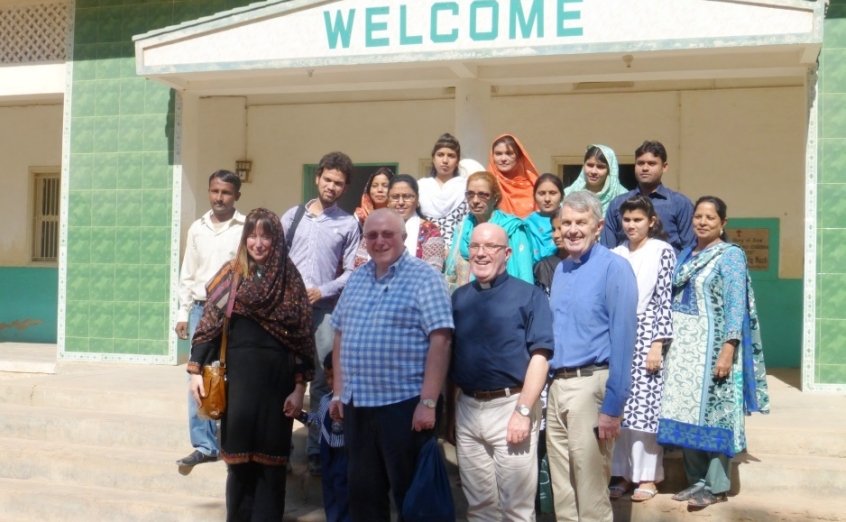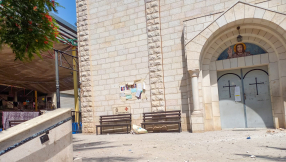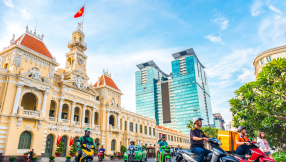
Two Christians from Pakistan are "shocked and depressed" after being refused visas to visit the United Kingdom because they are "not wealthy enough".
Their visit was to have been paid for by the Church of Scotland.
The Church's Glasgow presbytery sent a delegation last year to a congregation in Hyderabad and wanted to reciprocate by inviting the two Christians back to Glasgow this year.
The Church said: "Immigration officials refused the applicants visas on the basis they could not prove they were wealthy enough to be allowed into the UK."
The visits were intended to be part of the Church's attempts to develop a formal "twinning" link with the Hyderabad diocese.
Rev Graham Blount, clerk of the Glasgow presbytery, said they will not let the set back get in the way of forging links with Pakistan.
"We remain committed to our twinning link with the diocese of Hyderabad, with whom we enjoyed tremendous hospitality when members of our presbytery visited Pakistan last year.
"The Church of Scotland has spoken of its concern for Christians in Pakistan who, like other minority faith groups in that country, face growing threats in practising their religion.
"We are deeply concerned at the refusal of the UK Government to grant visas to two of our invited partners, despite the Church of Scotland guaranteeing their travel arrangements as well as their accommodation and subsistence while they are here, the refusal seems grounded in their personal financial circumstances."
The visa refusal document acknowledged that the Church of Scotland would have paid all costs of the visit, but nevertheless stated that the Pakistani Christians did not satisfy immigration rules.
It stated: "In brief I am not satisfied the bank statement is an accurate reflection of your financial circumstances. Given the above, I am not satisfied you are genuinely seeking entry as a general visitor for a limited period as stated by you not exceeding six months.
"Unless financial circumstances change future applications are likely to be refused. The refusal is not subject to appeal or administrative review."
Blount said: "The two individuals are very depressed and shocked at the way the applications have been handled. We have now rearranged the visit for a third time to take place next February, when we expect the two remaining members of the delegation who have dual nationality will finally be able to visit our city.
"We are now writing to the UK Government and local MPs to make our concerns known, and we are encouraging our members and anyone else who shares our concern to do the same.
"We are particularly worried that the UK Borders Agency's stance that this refusal threatens to frustrate not only our twinning link but also other major international events – like the World Council of Churches General Assembly for which a bid is currently being – in the future if only those whose personal finances meet the criteria are likely to be granted visas."
Wilson Choudhry of the British Pakistani Christian Association told Christian Today: "Fewer then 150 Pakistani Christian asylum seekers apply for refugee status in the UK every year. Despite this low risk, Pak-Christians applying to the UK through established churches and Christian groups for ministry work are often declined a UK visa even when organisations and individuals meet all government guidelines. Sadly the same level of scrutiny fails when hate preachers often enter our shores.
"This latest refusal is a poor indictment of the UK Home Office process which clearly is not free of bias. I will be praying for the family and will register concerns with the Home Office and Foreign Affairs Select Committee over the obvious maladministration and request a review of the decision. I hope something can be done to revoke the decision which flies in the face of common sense."
The Church of Scotland's World Mission Council faithshare visitors programme was to have paid for the visit and will still do so when if it goes ahead as planned with the two dual-nationality members next year. Faithshare finances about 150 similar visits each year, often from some of the poorest countries in the world and the poorest communities within these countries, the Church of Scotland said.
A Home Office spokesman said: "It is the responsibility of the applicant to ensure they submit the required evidence to show they meet the financial requirements for the visa category they have applied for. Where this evidence is not provided, applications will be refused."
The immigration rules state that an applicant wishing to enter the UK as a visitor needs to provide evidence that they are a genuine visitor and have a genuine intention to leave the UK at the end of their proposed visit. They must also be able to maintain and accommodate themselves during their visit without working or having recourse to public funds.













